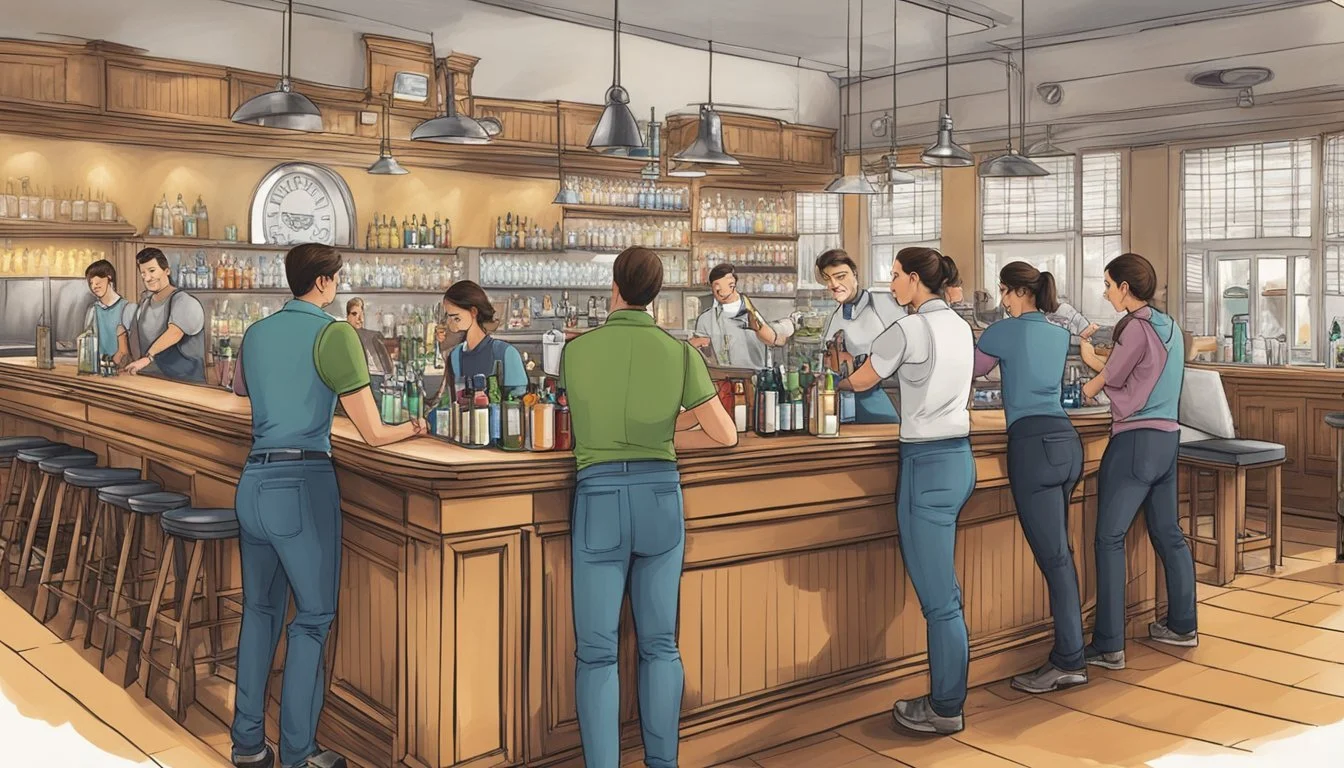Showcasing the Best Bartending Schools in Texas
Guide to Top Mixology Education
Texas has become a hub for those seeking to enter the dynamic world of bartending. Aspiring bartenders in the state have an array of options when it comes to sharpening their craft at dedicated training institutions. These bartending schools offer comprehensive courses that encompass both the practical skills of mixology and the customer service excellence necessary for success in the industry.
The Texas School of Bartenders, with a history dating back to 1987, stands out as a seasoned educator in the field, boasting multiple locations across the state, including Houston, Dallas, and Austin. This institution prides itself on providing hands-on training in a realistic bar setting, equipped with individual stations and actual bartending equipment. Experienced bartenders serve as instructors, ensuring that students receive current and relevant industry knowledge.
Another key player in bartender education within Texas is the Professional Bartending School, which presents tailored programs that cater to a range of student needs. Both schools highlight the importance of a practical learning environment that simulates real-world scenarios. This pragmatic approach to training is designed to instill confidence and competence in students, preparing them thoroughly for a successful career in bartending.
Why Choose a Bartending School in Texas
Choosing a bartending school in Texas offers aspirants an opportunity to learn in a dynamic environment, where they can gain the skills needed for a fruitful career in bartending. Whether aiming for a substantial income or to become a successful bartender, Texas provides both a unique bartending scene and excellent professional training.
Benefits of Professional Training
Learning the craft at a Texas School of Bartenders or similar institution equips students with a comprehensive skill set. Courses typically cover:
Mixology: core principles and innovative techniques.
Customer Service: crucial for guest satisfaction.
Legal Aspects: understanding of Texas alcohol laws.
Practical Application: hands-on experience behind actual bars.
The earnings potential for bartenders who receive professional training can significantly surpass that of their self-taught counterparts. Investing in a structured education can lead to not just great money but also longevity and adaptability in the industry.
Texas's Unique Bartending Scene
Texas stands out with its diverse and vibrant hospitality industry, featuring venues from classic honky-tonks to upscale cocktail lounges. By attending a bartending school in Texas, students immerse themselves in a culture known for its:
Diverse Clientele: exposing bartenders to a wide range of preferences.
Active Nightlife: abundant opportunities to practice and refine skills.
Community: a network of professionals who support growth and success.
The Lone Star State’s robust economy and tourism further enhance the likelihood of securing a well-paying position post-graduation for those seeking to make great money as a successful bartender.
Top Bartending Schools in Major Texas Cities
Texas offers a plethora of opportunities for those looking to enter the bartending profession, featuring a variety of reputable schools across its major cities. These institutions cater to the aspiring bartender with courses that range from mixology to bar management, equipping students with the skills needed to thrive in local bars, restaurants, hotels, and even upscale country clubs.
Dallas Bartending Schools
In Dallas, the Texas School of Bartenders stands out with its extensive curriculum. Students gain hands-on experience in actual bar settings, mastering the craft of mixology along with other essential skills such as flair bartending and bar management.
Houston Bartending Schools
Houston hosts the distinguished Anvil Bar & Refuge where expert-led bartending courses are complemented with practical knowledge on thriving in a busy urban bar scene. Aspiring bartenders in Houston are positioned to excel in various hospitality venues, from trendy bars to luxury hotels.
Austin Bartending Schools
The capital city, Austin, is home to a vibrant nightlife and a competitive market for bartenders. Schools here focus on all-around beverage service education, ensuring graduates can easily transition into local Austin bars and restaurants that are often at the center of the city's thriving social scene.
San Antonio Bartending Schools
San Antonio offers localized training through the San Antonio Bartending School, part of The Professional Bartending Schools of America. This family-owned establishment has been fostering bartending expertise since 1999 and situates students to work in a city rich with historic bars and restaurants.
Fort Worth Bartending Schools
In Fort Worth, aspiring professionals can find training programs that cater to the city's unique blend of Western heritage and urban sophistication. The available courses prepare students to serve in a variety of settings, from laid-back local watering holes to the high-stakes environment of Fort Worth's country clubs and hotels.
Key Features of Comprehensive Bartending Programs
When exploring bartending programs in Texas, prospective students should look for schools that provide a cohesive curriculum, proper certification, and in-depth mixology training to master over 150 drinks, including popular shooters like the Margarita.
Curriculum and Training Techniques
Comprehensive bartending courses offer a structured curriculum that includes hands-on training in a real bar environment. This approach ensures students develop practical skills crucial for employment. They learn free pour methods, mastering the art and science of measuring drinks without the use of shot glasses or jiggers. Additionally, the curriculum should cover the shake and strain method, a fundamental technique used in creating a variety of cocktails.
Hands-on Training: Engaging in real-world scenarios at a fully-equipped bar station.
Techniques Covered: Free pour, shake and strain, and other essential bar methods.
Certification and Accreditation
Reputable bartending schools in Texas emphasize providing graduates with recognized certification. This often includes courses approved or licensed by relevant educational authorities, asserting the program's credibility. Certification indicates a bartender's proficiency and is a valuable asset for job placement.
Certification: Proof of successful completion and skill competence.
Accreditation: Endorsement from regulatory bodies in education and bartending.
Learning Mixology and Drink Recipes
A key aspect of bartending programs is extensive training in mixology. Students should expect to learn how to create over 150 drinks, ranging from classic cocktails to creative modern concoctions. The course will likely highlight popular beverages such as the Margarita and other popular shooters, equipping graduates with a diverse and comprehensive drinks repertoire.
Breadth of Knowledge: Recipes for over 150 alcoholic and non-alcoholic beverages.
Focus on Popular Cocktails: Detailed instruction on high-demand drinks like the Margarita.
By emphasizing these key features, bartending programs in Texas aim to produce skilled, knowledgeable, and marketable professionals ready to excel in the dynamic and exciting field of bartending.
Navigating TABC Certification
Before starting their journey in the bartending industry in Texas, one crucial step for professionals is obtaining TABC certification. This section elucidates the legal framework governing alcohol service in the state and underscores the significance of certification from the Texas Alcoholic Beverage Commission (TABC).
Understanding Texas Alcohol Laws
Texas alcohol laws are stringent and designed to ensure that alcoholic beverages are sold and served responsibly. Prospective bartenders and servers are required to familiarize themselves with the Texas Alcohol and Beverage Code, which regulates the sale of alcohol. The TABC oversees the implementation of these laws and provides necessary guidance through its certification programs.
Bartenders in Texas, regardless of experience level, must comply with state regulations, which include obtaining the proper certifications to legally serve alcohol. Failure to adhere to these laws can result in severe consequences for both the server and the establishment.
The Importance of TABC Certification for Bartenders
TABC certification is an essential credential for bartenders that communicates a comprehensive understanding of the laws related to alcohol service. By becoming TABC certified, bartenders demonstrate their commitment to upholding these standards and reducing the risk of violations.
The certification process includes a course that covers critical topics such as checking identification, understanding signs of intoxication, and intervention techniques to prevent alcohol-related incidents. The TABC cert serves as a verification that the holder has the knowledge necessary to serve alcohol responsibly and therefore is a valuable asset to employers who prioritize safety and compliance.
The Career Outlook for Texas Bartenders
In Texas, the demand for skilled bartenders continues to rise, and those who undergo professional training stand to achieve greater earning potential and job placement success.
Job Opportunities across Various Venues
The job market for bartenders in Texas is robust, with opportunities spanning from local dive bars to high-end hotels. Earning potential varies widely, with reported hourly wages averaging $12.24, and the possibility to earn more with tips factored in. Superior bartenders, known for their mixology skills and customer interaction, can command higher earnings. In addition, many Texas-owned bartender training schools place a strong emphasis on job placement assistance programs, actively helping graduates find employment across a multitude of venues that keeps with the dynamic nature of the hospitality industry.
Starting Your Own Bar Business
For entrepreneurial bartenders, starting a bar in Texas is a prospective venture provided one is well-versed in the operational and legal aspects of the business. Bartending schools in Texas not only train successful bartenders but also impart knowledge that can be crucial for running a Texas bar. These institutions offer insights into obtaining the necessary certifications from the Texas Alcoholic Beverage Commission (TABC), allowing graduates the confidence to embark on business ownership with a solid foundation.
Financial Considerations for Bartending Students
When considering bartending schools in Texas, students must assess the upfront costs and weigh these against the long-term financial benefits of the profession. Understanding the outlay for tuition and materials, as well as potential earnings and job placement assistance, are crucial for making an informed decision.
Upfront Costs and Payment Options
Tuition: Bartending schools in Texas typically charge tuition fees. Examples of these costs may include:
Texas School of Bartenders: $595
Professional Bartending School: Starts at $175
Materials: Students should also budget for materials necessary for the course, which may be included in the tuition fee or charged separately.
Payment Options: Some schools offer flexible payment options, such as the ability to put $100 down and pay the rest over time, making it more accessible for those who cannot afford to pay the full cost upfront.
Long-Term Financial Benefits
Graduate Opportunities: Graduates of bartending schools often have access to job placement services, which can lead to opportunities in establishments with flexible hours and participation in various events.
Skillset: A comprehensive bartending course not only teaches mixology but also valuable customer service skills, enhancing a graduate's employability and potential to earn tips.
Students are encouraged to examine these financial factors as they relate to their personal goals and the bartending profession.
Flexible Learning: Finding the Right Schedule
When considering bartending schools in Texas, prospective students must evaluate the flexibilities in scheduling to accommodate their personal and professional commitments. The availability of part-time and full-time programs, as well as evening and weekend classes, plays a critical role in enabling students to learn without sacrificing their current job or responsibilities.
Part-Time vs. Full-Time Programs
Texas bartending schools offer both part-time and full-time programs. Part-time programs are designed to give students who have daytime commitments—such as work or family—the opportunity to pursue a new career in bartending without the pressure of a rigorous daily schedule. These programs typically spread over a few weeks or months and have classes that may occur a couple of times a week.
On the contrary, full-time programs are more intensive and ideal for students seeking to transition into their new career swiftly. Full-time schedules generally run from Monday through Friday with a more condensed curriculum that covers bartending essentials within a shorter timeframe, usually spanning several days to a few weeks.
Evening and Weekend Classes
For individuals who are employed during the day, many bartending schools in Texas provide evening classes. These classes usually begin in the late afternoon or early evening, allowing students to attend lessons after their workday has concluded. The structure of evening classes ensures that students do not have to compromise their current employment while gaining new skills.
Additionally, weekend classes cater to those who may have commitments throughout the week but have flexible hours available during the weekend. These classes are typically held on Saturdays and Sundays and are a popular option for students who are managing a busy weekday schedule but are eager to embark on a bartending career in Texas.
Building Professional Relationships in the Industry
In Texas, bartending schools emphasize the importance of forming solid professional relationships within the industry. They highlight networking and mentorship as essential tools for career advancement.
Networking with Industry Professionals
Texas bartending schools educate students on the significance of building connections with industry professionals. They facilitate events where students can meet and interact with experienced bartenders, managers, and business owners. Schools often collaborate with local hot bars and nightclubs to give students real-world exposure and the opportunity to forge working relationships.
Events: Attend industry mixers, local hospitality events, and career fairs.
Local Buzz: Stay informed about new openings and current hotspots to increase chances of building valuable relationships.
Advancing Through Mentorship and Connections
Successful bartenders often attribute part of their success to mentorship and well-established industry connections. Texas bartending schools pair students with mentors who can provide guidance and support.
Mentorship: Benefit from the knowledge and experience of seasoned professionals.
Connections: Use established networks for career opportunities and insights into the hospitality industry.
These schools encourage active engagement with mentors, offering channels for continuous learning and potential career growth within the vibrant Texas hospitality scene.
Practical Training: From Classroom to Bar
In Texas bartending schools, practical training bridges the gap between theoretical mixology education and real-world application. Through hands-on sessions in simulated bar environments, students become proficient in bar setup, service speed, and accuracy, preparing them for successful careers.
Mastering the Essentials of Bar Setup
A structured bar setup is the backbone of any efficient bar service. Students learn to organize their workspace, ensuring everything from liquors to garnishes is strategically placed for ease of access. They follow a step-by-step process that helps in establishing a workflow:
Organize glasses and stock them appropriately.
Position mixers, spirits, and tools for optimal efficiency.
Learn how to maintain a clean bar throughout service.
Bartending schools emphasize the importance of mise en place, the practice of having all ingredients prepped and ready to go before service begins. This setup ensures minimal delays and contributes to the overall customer experience.
Speed and Accuracy During Service
To thrive in high-pressure environments, bartenders must deliver drinks quickly without compromising on quality. Texas bartending schools prioritize accurate speed training, enabling students to balance pace with precision. They practice:
Timed cocktail mixing to increase proficiency.
Use of jiggers and measured pours for consistency in drink recipes.
Techniques to multitask without sacrificing the customer's experience.
Students execute these skills during mock service sessions where they experience the real bar feel, from opening to closing. This includes everything from checking ID and processing payments to cleaning and break down routines at the end of the night.
Tips for Aspiring Bartenders
For those eager to join the bartending profession, it's important they understand the dedication required and the reality of starting a career in this dynamic field.
Exploring the Bartending Lifestyle
The bartending lifestyle demands resilience and adaptability. Aspiring bartenders should be prepared for the energetic pace and the need to master a diverse array of drink recipes. Experience is valued in this profession, and many successful bartenders thrive on the bustling social environment and the opportunity to provide exceptional customer service. Those considering this career must be willing to engage with customers, manage busy shifts, and commit to continuous learning.
Getting Started in Bartending
To get started, aspiring bartenders often benefit from structured training at a credible school. Programs like the Texas School of Bartenders offer courses costing approximately $595, which include both tuition and materials. Before enrolling, candidates should request information from schools, assessing factors like cost, duration of courses, and the expertise of the experienced staff on hand. Developing skill sets that go beyond the basics—such as understanding the nuances of craft cocktails and customer preferences—lays the groundwork for becoming a successful bartender.
Conclusion
In the Lone Star State, aspiring bartenders have access to top-notch training. The Texas School of Bartenders and Professional Bartending School stand out as prime institutions, providing thorough education in mixology that ensures graduates are well-prepared for the industry.
Graduates from these programs report they are equipped with a valuable set of skills, fostering their potential in a competitive field.
The ABC Bartending Schools, with their multiple locations, offer an expansive network of resources for students.
By attending these esteemed schools, students gain a blend of theoretical knowledge and practical skills. They learn in environments that are both supportive and challenging, ensuring that the expertise they acquire is current and comprehensive.
Texas's best bartending schools have been shaping proficient mixologists for decades and continue to do so, thus helping to maintain the state's vibrant hospitality sector. Students come out as competent professionals, with a strong foundation in the art and science of bartending.
With options ranging from group classes that foster camaraderie to more personalized lessons for individual growth, Texas offers a spectrum of educational paths to suit different learning preferences and goals.
Key Features Notable Schools
Comprehensive training programs Texas School of Bartenders
Multiple locations for easy access ABC Bartending Schools
Affordable and varied class prices Professional Bartending School
Emphasis on practical skills -
These schools' commitment to high standards ensures that the bartending profession in Texas is well-serviced by skilled and creative individuals ready to dazzle with their mixology talents.












